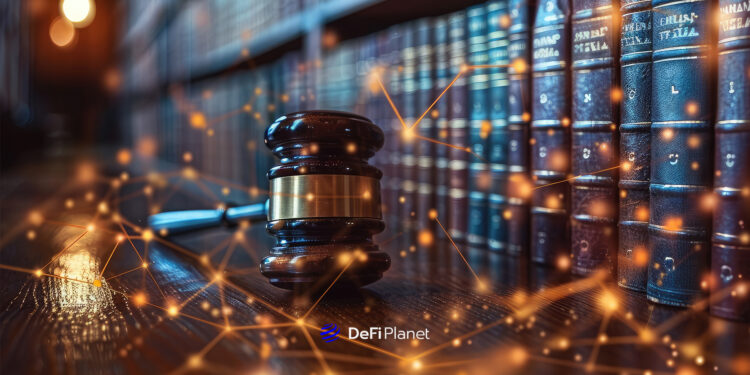Last updated on July 15th, 2025 at 06:11 pm
What happens if one steals millions in crypto assets, and when anyone asks why they did it, they simply say, “The code let me do it?” The authorities then hear this and summarily agree to let the perpetrator go free, and while this may sound absurd, there appears to be a valid argument to this effect. The term “code is law” refers to the idea that the codes that govern specific smart contracts are immutable and devoid of the interaction of central bodies or anyone seeking to regulate how these contracts should operate. They reinforce the ethos of decentralised agreements and help define the lines governing how such agreements should take place.
However, with increasing advancements in technology and blockchain, there have been legal implications and a debate about whether code really should be the supreme guiding principle behind smart contracts and whether real-world laws should take precedence over code. Once the code is deployed, it should run autonomously and execute the tenets of the agreements therein, according to its pre-programmed conditions. While the appeal seems evident in that there are no middlemen, courts or manual intervention, these codes don’t just exist in a legal vacuum.
Real-world laws and regulations still override the code, and ignoring these laws could lead to serious repercussions. The ethics of blockchain governance highlight that human oversight and values must guide decision-making, especially when code conflicts with real-world consequences. If code is law, people who exploit vulnerabilities in the code of, say, a blockchain protocol should not be prosecuted, as the code’s supposed supreme nature should have been able to safeguard against such exploitation. Why should legal systems classify it as fraud, and isn’t it just fair game since the code allowed it to happen?
In this article, we seek to demystify the “code is law” philosophy of the ethics of automated contracts and explore the implications and what it means for the larger ecosystem.
The Legal Perspective: Is Code Law?
A smart contract, while designed to be autonomous in its execution, is not immune to errors and some unintended outcomes that could happen during its deployment and, as such, necessitates the need for legal intervention. Smart contracts execute automatically without needing trust, but the ethics of automated contracts raise essential questions.
Traditional legal systems have had to step in when smart contracts contain errors, lead to unintended consequences or face external circumstances. In 2016, Decentralized Autonomous Organization(DAO) reported an incident where vulnerabilities in smart contracts were exposed, a coding flaw that allowed a hacker to steal about $60 million worth of cryptocurrency. This highlights the legal and financial risks associated with immutable code lacking safety mechanisms.
Even when they operate as programmed, smart contracts can still produce results that stakeholders will find objectionable, thus emphasizing the need for careful coding oversight. Smart contracts often lack provisions for certain external events that prevent their fulfilment, like natural disasters or regulatory changes, a radical difference that is at variance with traditional contracts because these contracts include force majeure clauses to address these circumstances. Adopting similar properties for smart contracts has remained difficult because of their rigid, code-based nature.
Once a smart contract executes, it is difficult to reverse it. Legal systems, like rescission or injunctions, might struggle to provide appropriate remedies, making methods like arbitration an emerging option. Arbitration offers a flexible and enforceable method for handling disputes in decentralized ecosystems, and it works by their inclusion in smart contract clauses, directing disputes from a designated arbitration body rather than traditional courts. Platforms like Kleros and Aragon Court use blockchain-based dispute resolution mechanisms where a network of independent jurors votes on outcomes.
Additionally, hybrid models combining off-chain legal oversight with on-chain execution are being explored to ensure fairness and adaptability while maintaining the efficiency of smart contracts. As blockchain governance evolves, integrating arbitration and legal recourse mechanisms into smart contract frameworks will be crucial for widespread adoption and trust in decentralized ecosystems.
Governments and regulatory bodies face difficulties overseeing smart contracts due to their decentralized and immutable nature, which is quite unlike conventional contracts. This immutability can lead to legal grey areas, mainly when a contract is used for illicit activities, such as money laundering or fraud. Jurisdictions like the European Union and the United States have started adapting regulations to address these concerns. The UK Law Commission, for example, has recognised smart contracts as enforceable under existing contract law, but global consensus is still evolving. Decentralized law and regulation aim to create fairer systems without central authority, but they also reveal a critical tension—without interpretive mechanisms, relying solely on code can lead to rigid outcomes that ignore ethical or legal nuance, reinforcing that code is not law.
Why “Code is Law” Can’t Be Absolute
The debate over “Code is Law” delves into fundamental legal philosophies, particularly the contrast between legal positivism and natural law. Legal positivism asserts that laws are human-made constructs enforced by institutions such as courts, regulators, and legislatures. This perspective allows for interpretation, flexibility, and adaptation to ensure just outcomes. In contrast, natural law suggests that certain principles are inherent, universal, and operate independently of human intervention—similar to the deterministic nature of code.
“Code is Law” is more closely aligned with the ideals of natural law, treating code as an immutable set of self-executing rules that govern digital interactions without the need for human oversight. The fact that modern legal systems are rooted in legal positivism, where human-made laws take precedence over automated systems, is crucial because legal systems are designed to account for context, ethical considerations and evolving social norms that preprogrammed code will struggle to replicate.
Realistically, the supremacy of law remains intact because governments actively regulate blockchain and cryptocurrency, and legal systems ultimately override any self-imposed “Code is Law” principles. Without legal recognition and enforcement, code-based rules remain limited in scope and applicability. Moreover, smart contracts and decentralized applications cannot resolve complex human disputes requiring interpretation, negotiation, and equitable judgment—reinforcing why law, not code alone, must govern the digital world.
The Ethical and Moral Implications
1. The Problem of Unintended Consequences
Because smart contracts execute automatically, they usually lack the flexibility of human judgment. Consider a smart contract that manages supply chain payments, for example. If a natural disaster were to disrupt production, traditional contracts would allow for a renegotiation, but a smart contract would execute regardless of the real-world situation, like a robot. This rigidity can lead to morally questionable outcomes where fairness is sacrificed for automation.
2. Bias and Ethical Programming
The “Garbage In, Garbage Out” principle also applies to smart contracts. If a contract is designed with biased logic—intentionally or unintentionally—it could lead to unfair outcomes. For example, a decentralized lending smart contract may include biased risk assessment parameters, disproportionately putting certain users at a disadvantage. The moral responsibility for such biases falls on developers, raising ethical questions about accountability.
3. Decentralization vs. Accountability
Smart contracts usually operate on decentralized networks, meaning no single entity controls them once deployed. While this helps to enhance trust and transparency, it could also mean that there are no clear avenues for resolution when things go wrong. If a flaw in the code causes financial loss, who is responsible—the developer, the deployer, or the users who interacted with it? These unresolved questions highlight the limitations of treating code as absolute law.
The Future of Smart Contracts and Law
As smart contracts become more prevalent, hybrid models integrating legal oversight with automation are emerging.
Potential solutions might include:
- Legal Kill Switches: Embedding mechanisms that allow courts to intervene in extreme situations.
- Oracles and External Governance: Introducing flexibility using real-world data sources (oracles) and governance mechanisms.
- AI-Powered Dispute Resolution: Employing artificial intelligence to mediate smart contract disputes fairly and efficiently.
Ultimately, while code can enforce agreements precisely, it cannot replace the nuanced decision-making required in complex legal and ethical scenarios. Law and morality require human judgment, adaptability, and fairness—elements that pure code lacks.
In Conclusion
While smart contracts represent a groundbreaking shift in how agreements are executed, the notion that “Code is Law” is not absolute. Legal systems, ethical considerations, and real-world complexities necessitate a balance between automation and human oversight. As blockchain technology evolves, our legal frameworks must evolve to ensure that innovation aligns with justice and fairness.
One key challenge lies in addressing the rigidity of smart contracts. Unlike traditional contracts, which allow for interpretation and discretionary judgment in the event of unforeseen circumstances, smart contracts execute automatically based solely on pre-coded conditions. This can lead to unintended consequences when external factors—such as regulatory changes, market fluctuations, or coding errors—disrupt the intended outcomes.
Moreover, legal recourse remains a significant consideration. In traditional legal systems, courts can intervene in contract disputes, void unfair agreements, or provide remedies for breaches. In contrast, smart contracts, by design, lack a centralized adjudicating authority. This raises the question: how can parties seek redress if a smart contract executes in a way that is unjust or contrary to broader legal principles? Solutions may involve the integration of oracles for dynamic contract adjustments, governance mechanisms for dispute resolution, or hybrid models that combine smart contract automation with legally binding agreements.
Additionally, ethical concerns must be taken into account. While blockchain enables decentralization and trustless transactions, it also introduces risks, such as financial exclusion, algorithmic bias, and the potential for malicious exploitation. Ensuring that smart contracts promote fairness and accessibility requires collaboration between technologists, legal experts, and policymakers.
The future will likely see a fusion of smart contract efficiency with traditional legal safeguards, creating a system that is both trustless and just. By embedding legal compliance, dispute resolution frameworks, and adaptive mechanisms into smart contract infrastructure, blockchain technology can achieve a balance between innovation and accountability, paving the way for a more resilient and equitable digital economy.
Disclaimer: This piece is intended solely for informational purposes and should not be considered trading or investment advice. Nothing herein should be construed as financial, legal, or tax advice. Trading or investing in cryptocurrencies carries a considerable risk of financial loss. Always conduct due diligence.
If you would like to read more articles like this, visit DeFi Planet and follow us on Twitter, LinkedIn, Facebook, Instagram, and CoinMarketCap Community.
Take control of your crypto portfolio with MARKETS PRO, DeFi Planet’s suite of analytics tools.”





















